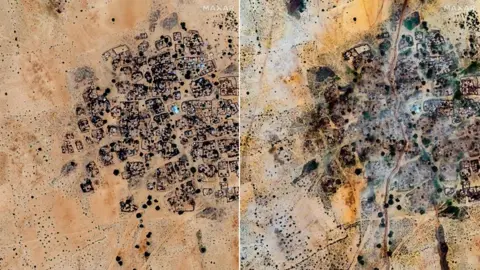Recent satellite images indicate the construction of an extensive earthen wall around the besieged Sudanese city of El-Fasher, raising concerns over the humanitarian situation in the area. According to a study by Yale University's Humanitarian Research Lab (HRL), more than 31 kilometers of raised banks, known as berms, have been built since May 2025 in territories outside the city occupied by the paramilitary Rapid Support Forces (RSF).
El-Fasher, which has been under siege for over a year, is one of the last significant strongholds for Sudan's armed forces amid ongoing fighting with the RSF that began in April 2023. The Sudan Doctors Network has reported an escalation of RSF attacks on the city, focusing on civilian areas.
Dr. Mohamed Faisal Hassan, associated with the Sudan Doctors Network, noted that recent shelling targeted civilian locales, resulting in numerous casualties, including 24 deaths and 55 injuries within a single day. The RSF's actions have been characterized as deliberate assaults on non-military targets.
Analysis from the HRL indicates that the RSF is effectively creating a 'kill box' around El-Fasher through the construction of these berms, which complicates civilian escape and the delivery of humanitarian aid. The RSF has been accused of employing ethnic targeting, further complicating an already dire situation for many living in El-Fasher, which is home to around 300,000 people.
Humanitarian organizations have struggled to reach El-Fasher for months, leaving residents in desperate need of food, medical care, and safe passage out of the city. In light of this, appeals have been made to international entities, including the UN Security Council, to intervene and protect the civilians suffering amidst this conflict.
Experts warn that the ongoing siege and the potential fall of El-Fasher to RSF control could lead to further destabilization in Sudan, with risks of territorial partition as both warring factions strengthen their respective positions.



















